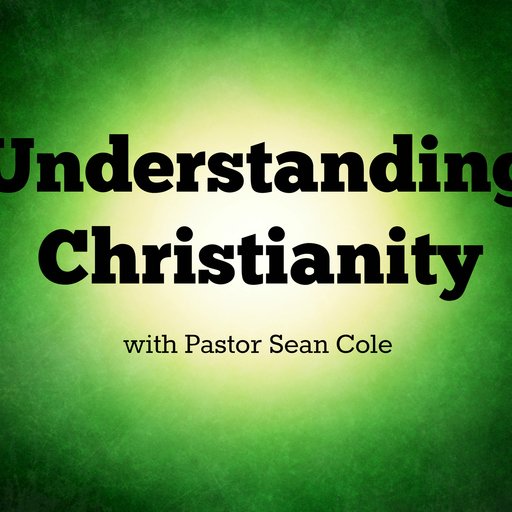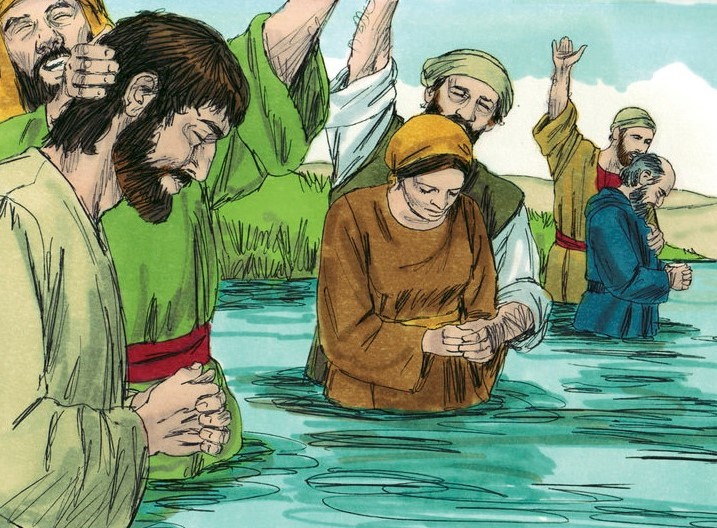Podcast: Play in new window | Download
Subscribe: Spotify | Email | RSS

After our December 2019 dialogue Dr. Cole followed up on his Understanding Christianity podcast, mounting some new arguments that according to the New Testament God is the Trinity. In this episode I start to evaluate these arguments. Pastor Cole particularly focuses on this famous text:
“Go therefore and make disciples of all nations, baptizing them in the name of the Father and of the Son and of the Holy Spirit…”
Matthew 29:19, ESV
According to a famous 19th century unitarian Christian scholar, a better translation would be:
“Go ye, therefore, and make disciples of al nations; baptizing them to the Father, and to the Son, and to the holy spirit.”
I discuss why he thinks this, and what I make of this passage, and of Dr. Cole’s claim that it teaches the one God to be the Trinity.
Then pastor Cole argues from the Gospel according to John. He doubles down on some of his claims about ch. 1, and also mounts an argument from the “I am” sayings of Jesus in that book. Is Jesus here claiming to be God himself by applying God’s own name to himself?
He also argues that John 1:18 teaches that “Jesus is God.” I explain why I think this is mistaken, as is Dr. Cole’s claim that John 20 teaches that Jesus is the one God.
Next week I’ll evaluate his arguments based on the writings of Paul.
Links for this episode:

- Isaiah 42:8; Exodus 3:14; Matthew 29:18-20; Genesis 48:16; Ruth 1:2; Exodus 23:13; Deuteronomy 18:20; 1 Samuel 7:9; 1 Chronicles 17:8; Luke 6:22; John 17:13; 1 Corinthians 8:4-6; Ephesians 4:4-6; John 1:1; John 1:14; John 1:18; Colossians 2:9; John 10:38; John 14:10-12; Hebrews 1:3; John 8:40; Exodus 3:14; John 14:6; John 8:12; John 9:5; John 20:31; John 6:32-35; John 9:8-9; John 4:25-26; John 8:58; John 15:1; John 15:5; John 10:27-30; John 10:30; 1 Corinthians 3:5-8; John 5:19; John 20:28; John 20:17; John 20:31; Hebrews 1:8-9; John 8:54.
- podcast 283 – Does the Bible Teach that God is a Trinity? Cole-Tuggy Dialogue – Part 2
- podcast 282 – Does the Bible Teach that God is a Trinity? Cole-Tuggy Dialogue – Part 1
- Dr. Sean Cole homepage, his podcast “Understanding Christianity”
- What is the Trinity?
- The Lost Early History of Unitarian Christian Theology
- podcast 124 – a challenge to “Jesus is God” apologists
- in The Journal for Trinitarian Studies and Apologetics (Volume 1)
- Debate – Dr. Dale Tuggy vs. Chris Date “Is Jesus Human and not Divine?”
- podcast 108 – Dr. Robert M. Bowman Jr. on triadic New Testament passages – part 2
- podcast 107 – Dr. Robert M. Bowman Jr. on triadic New Testament passages – part 1
- Norton, A Statement of Reasons for not Believing the Doctrines of Trinitarians concerning the Nature of God and the Person of Christ, 3rd. ed.
- “radiance” in Hebrews 1:3 (Greek: apaugasma)
- Ridderbos, The Gospel of John: A Theological Commentary
- Mullins, “The Doctrine of Divine Simplicity“
- podcast 63 – Thomas Belsham and other scholars on John 8:58
- Biblical Words for God and for his Son Part 1 – God and “God” in the Bible
- Jesus’s argument in John 10
- This week’s thinking music is “Street Dancing” by Timecrawler 82.


Doesn’t the baptismal formula unify the entities that are named within it?
Can any unitarian ironically deny this?
As far as Jesus receiving authority he had to first complete his mission and ascend the throne did he not? This, not the fact that he is not divine, explains why this authority had to be given to him.
Paul,
Could you explain why you think it is so plain that the baptismal formula “unifies the entities” that are named within it? If I said, “In the name of the Queen, the high court, and the people of England” is there some unification of the listed entities? Would anyone really read these things and jump straight to abstract, metaphysically nuanced conclusions? It just doesn’t seem so plain and obvious to me. Perhaps you can help me see why you think so?
Hello,
I have a question about the seven “I am’s” or better the seven descriptions Jesus is giving.
Are those cases of Personification? Or does that term not apply in this cases?
Thank you.
They’re the opposite a personification – describing a person/self as if here were not a person/self – such as a way, truth, a light, etc.
Dale, good example of “in the name of the law, constitution, etc.” Dr. Cole’s point on Matt 28:19 misses the basic definition of the Greek word for name (onoma) which means authority, character, honor, besides appellation (what one is called). This is also consistent with what Jews in Jesus’ day (even if they spoke Aramaic) would know of the Hebrew word for name (shem) which again means authority, character, honor. Nearly every dictionary or lexicon shows this. Making and baptizing disciples in the “name” of the Father, Son, and Holy Spirit means doing so in the authority of the Father (an authority He also granted to His Son/Messiah who overcame), by their presence and power (consistent with HS in NT). It also reflects the character (our qualities) we live by – holy and righteous followers who obey Jesus’ commands full of fruit of the Spirit – the same qualities God and Jesus both possess.
We know these qualities (or this character) originate/s from the one true God – the Father, and we share in them because Jesus baptizes us with the spirit (Mt 3:11, Mk 1:8). There is no contradiction between this and “all the father has is mine” (Jn 16:15), or the Father sending in Jesus’ name (Jn 14:26), because it is both of them – their authority, character, honor, present in us who obey (Jn 14:21-23). Dr. Cole does what so many do by confusing these simple concepts into theological metaphysical substances, “being”, essences, and deity, when the text does not do so.
Comments are closed.